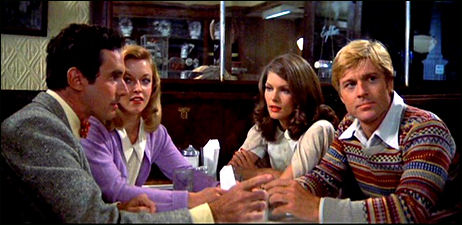Among Joe Queenan‘s choices of the worst films ever made, he puts Futz (’69), about a man who falls in love with a pig, at the top of the list, followed by La Grande Bouffe, A Walk With Love and Death, Pier Paolo Pasolini‘s Salo, or the 120 Days of Sodom (“as vile as any film I have ever seen”) and Sydney Pollack‘s The Way We Were for being “as treacly and flatulent as any movie I know of.”

I’ve also found portions of Pollack’s 1973 film grating — I want to reach out and strangle Bradford Dillman‘s character every second he’s on-screen, I’ve always hated songwriters Alan and Marilyn Bergman‘s title song, and Marvin Hamlisch‘s score has always strike me as way too stringy and MOR. But Queenan has an arterial blockage if he doesn’t get that the curious spiritual tension between Robert Redford‘s Hubbell and Barbra Streisand‘s Katie is one of the most intriguing undercurrents ever used in a mainstream romance film.
As drippy as their union may seem to Queenan in other ways, it is based upon spiritual emptiness (in Streisand’s character also) and a need to try and fill the void with what the other has. Redford plays a talented but relatively shallow writer whose attraction to Streisand is based upon her possessing the fire and conviction that he lacks, and her belief that he has more depth than he himself believes is there. Perhaps not the most profound idea to ever animate a film of this kind, but it’s dramatized intelligently and with a certain old-school delicacy and poise. This alone means Queenan can’t condemn TWWW as one of the all-time worst. It’s sloppy critical thinking.
And you can’t dismiss a film as a legendary stinker, even by curious personal standards, if it has a single great scene, which The Way We Were clearly does. You can’t say the rapprochement-outside-the-Plaza Hotel scene at the very end doesn’t work. Not when Streisand first meets Redford and his new shiksa wife, but when he comes back the second time, alone, and says, a little sadly, “You never give up, do you?” That is what’s known in movie-lover circles, whether or not you hate Redford or Streisand or Hamlisch or anyone or anything else connected with this film, as “good stuff.”
Which means that The Way Were cannot be dismissed in Queenan-type fashion. One of the most elemental Movie God laws states that any film that has one effective scene must always be afforded at least a measure of respect. Even if 95% of it is awful or mediocre, the presence of one great scene always saves it.









